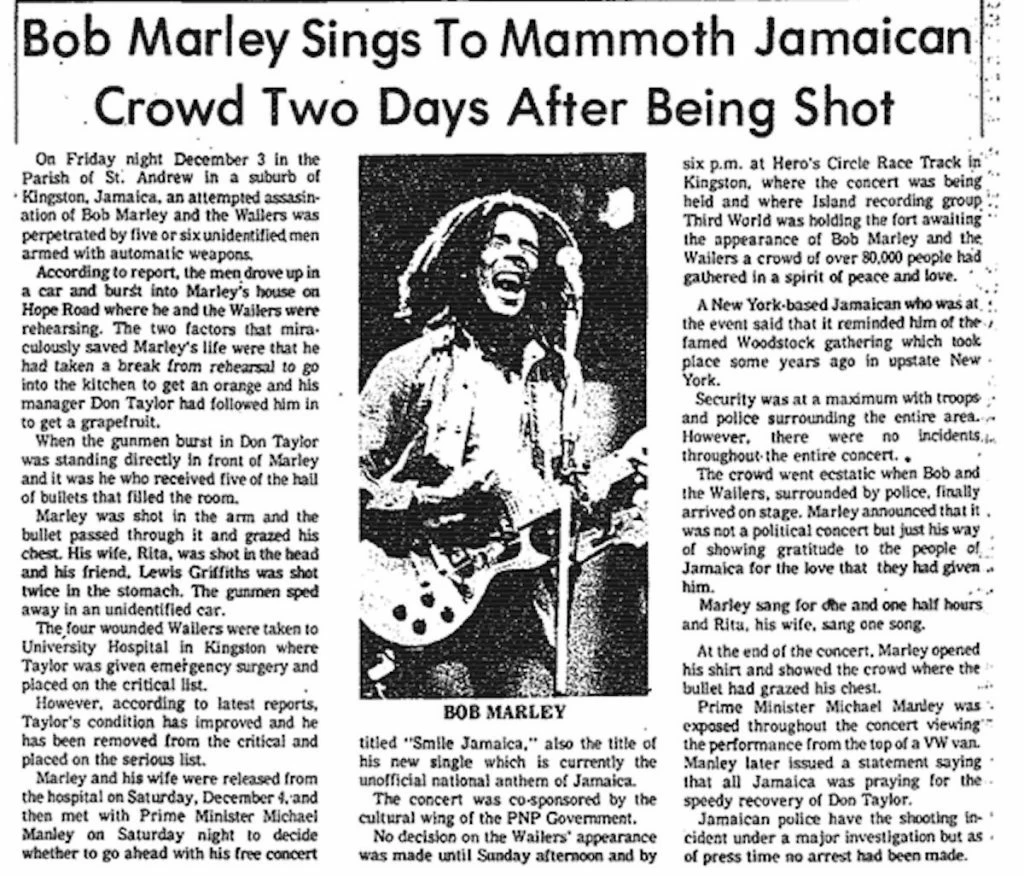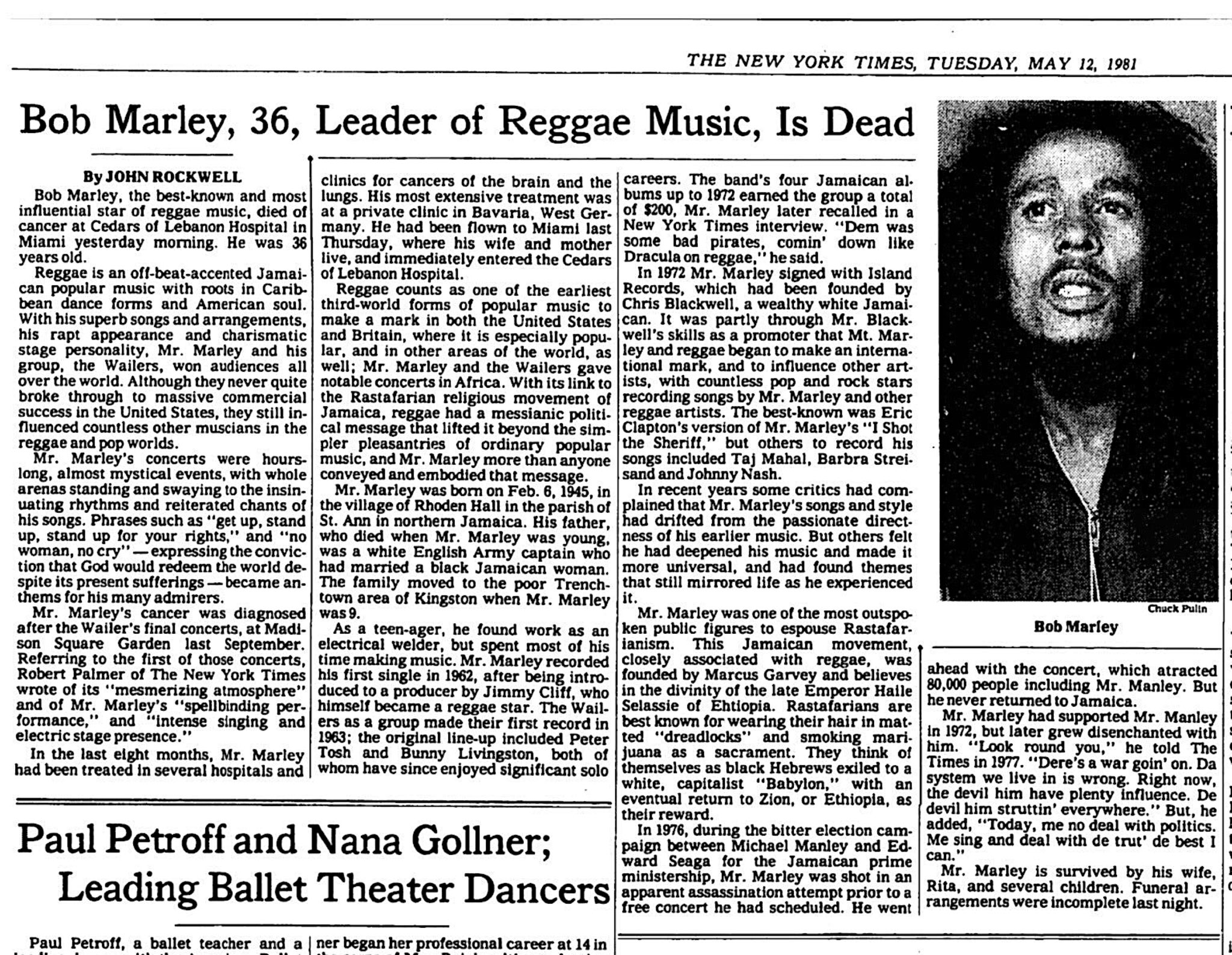Bob Marley Death Reason: Unveiling The Truth Behind A Legend's Passing
When we talk about legends, Bob Marley’s name is one that resonates with millions across the globe. His music, his message, and his spirit have transcended generations. But behind the iconic image lies a tragic story of how this legend met his untimely end. Today, we’re diving deep into the Bob Marley death reason, uncovering the facts, and separating truth from myth.
Bob Marley wasn’t just a musician; he was a cultural icon, a symbol of peace, love, and resistance. His music spoke to the soul, and his legacy continues to inspire millions. But despite his worldwide fame and influence, his life was cut tragically short at the age of 36. So, what really happened? Was it illness, conspiracy, or something else entirely?
In this article, we’ll explore every detail surrounding Bob Marley’s death, backed by credible sources and expert insights. Whether you’re a die-hard fan or simply curious about the man behind the music, this piece aims to shed light on one of the most talked-about moments in music history.
Read also:Exploring Free Remote Access Solutions For Iot Devices
Table of Contents
- Bob Marley Biography
- Health Issues Leading to His Death
- What Is Melanoma?
- Diagnosis and Treatment Journey
- Conspiracy Theories Surrounding His Death
- Impact on the Music Industry
- Legacy After Death
- Family Life and Personal Relationships
- Final Days and Moments
- Conclusion
Bob Marley Biography
Early Life and Rise to Fame
Before we dive into the Bob Marley death reason, let’s take a step back and understand the man himself. Born on February 6, 1945, in Nine Mile, Jamaica, Bob Marley was the son of Norval Marley, a white Jamaican of English descent, and Cedella Booker, a Black Jamaican woman. His early life was marked by struggles, but it was these challenges that shaped his unique voice and message.
By the late 1960s, Bob Marley had already begun making waves in the music scene. With his band, The Wailers, he introduced reggae to the world, blending social commentary with soulful melodies. Tracks like "No Woman, No Cry" and "Stir It Up" became anthems of resistance and hope.
But beneath the fame and fortune lay a man who was deeply connected to his roots and his faith. Bob Marley was a devout Rastafarian, and his beliefs heavily influenced his music and lifestyle. This connection would later play a significant role in his medical decisions and ultimately his fate.
| Full Name | Robert Nesta Marley |
|---|---|
| Date of Birth | February 6, 1945 |
| Place of Birth | Nine Mile, Jamaica |
| Occupation | Singer, Songwriter, Activist |
| Spouse | Rita Marley |
| Children | 11+ (various sources) |
Health Issues Leading to His Death
Bob Marley’s health journey wasn’t something that happened overnight. It was a series of events that, looking back, painted a clearer picture of his declining health. The story begins with a seemingly minor issue—a soccer injury.
In 1977, during a casual game of football, Bob Marley injured his toe. At first, it seemed like nothing serious. However, when the wound didn’t heal properly, he sought medical attention. That’s when doctors discovered something alarming—a malignant melanoma, a form of skin cancer, had developed under his toenail.
What Is Melanoma?
Melanoma is one of the most dangerous types of skin cancer. It often develops in moles or areas of the skin that have been exposed to excessive sunlight. What makes melanoma particularly deadly is its ability to spread rapidly to other parts of the body if not treated early.
Read also:Discover Diana Ross Net Worth Age And Personal Life 2023
Here’s the kicker: melanoma doesn’t discriminate based on skin color. While it’s more common in lighter-skinned individuals, darker-skinned people can still develop it, especially in areas like the palms, soles, and under the nails. This is exactly where Bob Marley’s melanoma was found.
Diagnosis and Treatment Journey
When doctors first diagnosed Bob Marley with melanoma, they recommended amputating his toe to prevent the cancer from spreading. But Bob refused. Why? Well, it all comes down to his faith and personal beliefs.
As a Rastafarian, Bob Marley believed in the sanctity of the body. Amputation went against his spiritual principles. Instead, he opted for a less aggressive treatment plan, hoping to manage the condition without compromising his values.
Unfortunately, this decision proved fatal. By 1980, the cancer had spread to his lungs and brain. Despite undergoing intensive treatments, including chemotherapy, Bob Marley’s condition continued to deteriorate.
Conspiracy Theories Surrounding His Death
Whenever a legend like Bob Marley passes away, conspiracy theories are bound to emerge. Some claim that his death wasn’t due to natural causes. Instead, they suggest foul play or political motives.
- Political Assassination: As a vocal advocate for peace and social justice, Bob Marley made enemies in high places. Some believe his death was orchestrated by those who feared his influence.
- Curse or Spiritual Attack: In Jamaican culture, spiritual warfare is a real concern for many. Some speculate that Bob Marley fell victim to a curse or supernatural attack.
- Medical Negligence: Others argue that the medical community failed Bob Marley by not addressing his condition sooner or offering better treatment options.
While these theories make for intriguing discussions, most experts agree that Bob Marley’s death was the result of untreated melanoma. His refusal to undergo amputation likely accelerated the cancer’s progression.
Impact on the Music Industry
Bob Marley’s death sent shockwaves through the music industry. Not only did it mark the loss of a musical genius, but it also highlighted the importance of early cancer detection and treatment. His passing inspired countless artists to speak out about health awareness and the need for regular check-ups.
Even today, Bob Marley’s music continues to inspire new generations. Tracks like "Redemption Song" and "One Love" remain timeless classics, reminding us of the power of music to unite and heal.
Legacy After Death
Bob Marley may have left this world too soon, but his legacy lives on. His music has transcended borders, languages, and cultures, becoming a universal language of peace and unity. The Marley family has carried on his torch, ensuring that his message continues to resonate with millions.
His impact extends beyond music. Bob Marley’s name is synonymous with Jamaica, reggae, and the Rastafarian movement. He remains a symbol of hope, resilience, and the fight for justice.
Family Life and Personal Relationships
Bob Marley’s personal life was as colorful as his music. Married to Rita Marley, he fathered over a dozen children with various partners. While his family life was complex, it was also filled with love and mutual respect.
Rita Marley played a crucial role in Bob’s career and personal life. She supported him through thick and thin, even stepping in to perform when he was unable. Together, they built a family that continues to honor his legacy.
Final Days and Moments
In May 1981, Bob Marley’s health had deteriorated to the point where he could no longer perform. He was on his way back to Jamaica from Germany, where he had been receiving treatment, when his condition worsened. He passed away in a Miami hospital on May 11, 1981, at the young age of 36.
His final moments were spent surrounded by loved ones, including his wife and children. Despite the sadness, there was a sense of peace, knowing that Bob Marley had lived a life filled with purpose and meaning.
Conclusion
Bob Marley’s death reason is a tragic reminder of the importance of early detection and treatment. While his passing was untimely, his legacy continues to inspire millions around the world. His music, his message, and his spirit will forever be etched in the hearts of those who believe in a better tomorrow.
So, what can we learn from Bob Marley’s story? For one, never underestimate the power of music to bring people together. Secondly, prioritize your health and seek medical attention when needed. Lastly, live your life with purpose and passion, just like Bob did.
Feel free to share your thoughts in the comments below or explore more articles on legends who’ve shaped our world. Keep the conversation going and let’s honor Bob Marley’s memory by spreading love and positivity wherever we go. Cheers, fam!



